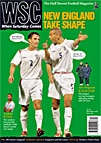 The lovable chaps at the G-14 have a new, familiar face in charge. Steve Menary wonders whether David Dein will preside over a winning team or is resigned to fighting a rearguard action.
The lovable chaps at the G-14 have a new, familiar face in charge. Steve Menary wonders whether David Dein will preside over a winning team or is resigned to fighting a rearguard action.
Anyone confident of winning a court case would not start publicly discussing a settlement a year before they were due in court. Yet that is what David Dein began doing on taking over as president of the G-14 group of clubs in late October. G-14 are backing Charleroi’s case against FIFA for €615,000 (£413,000) compensation for an injury Abdelmajid Oulmers suffered while playing for Morocco in 2004. He took eight months to return to action for the Belgian club. G-14 also threw their weight behind an action by one of their own members, Lyon, for €1 million in compensation from FIFA over an injury to France defender Eric Abidal in a friendly last year.
The Charleroi case was referred to the European Court of Justice in May after the ECJ ruled that FIFA were not exempt from European Union law, as Sepp Blatter insists on the grounds that they are based in Switzerland. That was a significant victory in G-14’s long-running battle over compensating clubs for releasing players for international duty and any injuries incurred while away – so why discuss a settlement?
Dein has declined to explain his strategy, leaving that to G-14’s general manager, Switzerland-based Thomas Kurth. Kurth said: “It’s always those same two problems [releasing players and injuries suffered in internationals]. Rather than do nothing until the judge comes up with a verdict, let’s knock on the door of UEFA, which is closest to the big clubs, to see if we can work out a solution to put to FIFA. We hope those that created the problems [FIFA] would be prepared to open the door to resolve them.”
But how can FIFA compromise? Would a solution, for example, see the Icelandic FA paying wealthy Barcelona to get Eidur Gudjohnsen back to Reykjavik to play for his country?
Kurth adds: “With player release, there will never be an agreed solution that FAs pay clubs when a player is on national duty. But the clubs put in a lot to players that go on international duty while getting nothing out. At the moment, there is no upside for the clubs, only risks. Revenue from centrally marketed tournaments could be distributed to an extra party and that would be the clubs. We do not think a fair share would damage the grass roots of the game.”
G-14 insist the “foundation stone of football” is the clubs – not just G-14 members such as Bayern Munich, Juventus and Barca, but the rest, too. Formed in 2000, G-14 had a second influx in 2002, including Dein’s club Arsenal. Kurth sees either more clubs joining G-14 or a reconciliation between the clubs and governing bodies that will do away with the need for a lobbying group that has come to epitomise the growing influence of corporate culture in football.
Surely G-14 would not disband unless a significant victory is in sight with a stake in the running of football secured? Shortly after Dein – widely regarded as a conciliatory figure – was named president, an investigation by a Swiss court into FIFA’s rule that players must be released for internationals was suspended until the ECJ’s decision is known. With FIFA bypassing G-14 through ideas such as their clubs task force, the lobby group has been trying to cosy up to UEFA.
Unfortunately for Dein, the review of European football commissioned by the EU and UEFA from former Portugal Sports Minister José Arnaut, which was published last month, contrasts with G-14’s ambitions. Arnaut’s socialistic proposals, which encourage fan ownership of clubs, could lead to football being treated as different to other businesses under EU law.
UK Sports Minister Richard Caborn is willing to back enforcing such a move, which is possible through the EU’s Nice declaration of 2000. That could possibly scupper G-14 legally and Dein must know that. With UEFA having turned the Champions League into the elitist cash cow that G‑14 wanted, Dein and his cohorts may just have recognised that they are fighting a losing battle.
From WSC 238 December 2006. What was happening this month